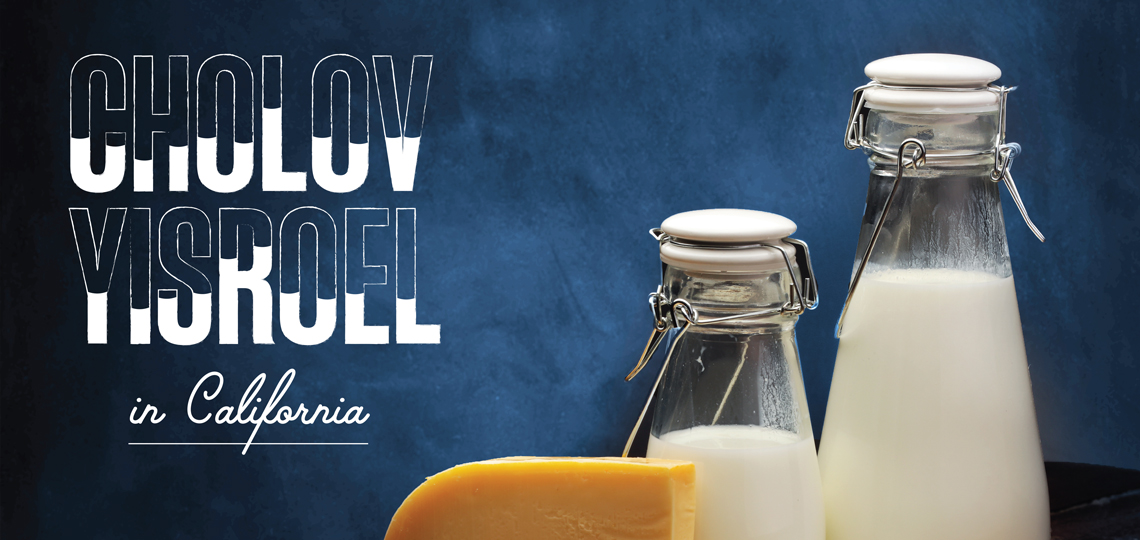by Rabbi Shlomo Klein, Rabbinic Coordinator
Walk into any kosher grocery or supermarket in Los Angeles or surrounding communities and you have not just one, but a choice of two, brands of fresh, local, OK certified Cholov Yisroel milk. While it may seem strange to get excited about a simple cup of milk, for many people in these communities this has been a long-awaited dream come true.
California is the largest producer of milk in the US, with dairies that produce more milk than all eleven northeast states combined. However, producing Cholov Yisroel milk in California has always been a significant challenge.
According to halacha (YD 115:1), milk is considered kosher only when the milking is supervised by a mashgiach to ensure that milk from non-kosher animals was not blended into the kosher milk. Many communities
throughout the world follow Rav Moshe Feinstein’s leniency (Igros Moshe YD 1:47-49) that when there is proper government control of the dairy industry with adequate inspections, we can safely assume that milk, labeled as milk, is 100% from a cow. Rav Moshe rules that this absolute knowledge is the halachic equivalent of a mashgiach witnessing it. Such milk is commonly referred to as cholov stam (regular milk).
However, Rav Moshe (YD 2:35 and 4:5) limits this leniency to circumstances where CY is difficult to obtain. In addition, many communities follow the ruling of other major poskim that do not agree with Rav Moshe’s approach.1
The OK and most other kosher agencies certify cholov stam to provide dairy products to those who do rely on Rav Moshe’s ruling. These products are labeled as OK -D. The OK certified Cholov Yisroel products have the words Cholov Yisroel or ישראל חלב clearly printed on the label. OK certified food service (dairy restaurants and catering) are always Cholov Yisroel.
Kehilla of Los Angeles was established by Rav Avrohom Teichman in 1979. One of its first missions was to help introduce fresh and reliable Cholov Yisroel milk to the wider community. In 1981 a company named Quality Kosher was established and produced Kehilla certified Cholov Yisroel milk at Norwalk Dairy (after a brief stint at Chase Bros. Dairy in Oxnard). This lasted for over 20 years. In 2013 Norwalk Dairy closed shop leaving the West Coast communities without a viable option for local, fresh Cholov Yisroel milk.
At that point, distributors started to import milk from the East Coast. However, due to the travel time and handling throughout the shipment, the quality of the milk was subpar. The Cholov Yisroel community became accustomed to “there is no milk” due to the truck being bogged down in a Midwest snowstorm or because vacationers emptied out the grocery refrigerators. Additionally, shipping caused an increase in price on the already more costly Cholov Yisroel milk.
All the above reasons caused many people who would have otherwise consumed Cholov Yisroel milk to go out and buy Cholov Stam milk instead. Several attempts to produce Cholov Yisroel milk locally failed. People invested time and money to explore different options. The main challenge is that most farmers are not processing the milk themselves anymore, but are selling it to 3 large co-ops – CDI, DFA and Land O’Lakes. These co-ops collect the milk from over 1,500 farms and sell it to large dairies and cheese plants for processing. This makes it extremely difficult to ensure that the Cholov Yisroel milk will not be compromised as it flows through
the multiple pipes, tanks, tankers, and processing equipment.
Two companies, Kosher Pastures and La Crème, did not give up and with great effort and Siyata Dishmaya they reached their goal at around the same time. While there are some differences between the two, their kashrus standards are equally the highest and without compromise. The OK monitors veterinarian records to ensure that there are no DA cows on the farm.2 Before every Cholov Yisroel production all equipment (pipes, tanks, tankers, pumps, chillers) are cleaned and sanitized, and filters are replaced. Heated equipment is kashered at boiling temperatures (212°F)3 and is done after a 24-hour downtime (Eino Ben Yomo). Most importantly, we have highly skilled mashgichim, respected Yerei Shomaim, who keep Cholov Yisroel in their own homes, supervising the milking from the beginning until the end.
The Chanuka story of Yehudis killing the Greek general after feeding him cheese shows that milk has intoxicating properties4; therefore, let us raise a glass of milk and say L’chaim!
1 .חלקת יעקב יו”ד סי’ ל”ד, דעת סופר יו”ד סי’ לו, מגדלות מרקחים יו”ד סי’ סי’ כח, שו”ת קנין תורה ח”א סי’ לח. וע”ע מנחת יצחק ח”ב סי’ כא. ועוד כתבו שיש טעמים כמוסים
ופנימיים לאיסור חלב שחלבו גוי עי’ ערוך השולחן יו”ד סי’ קטו ס”ו דרכי חיים אות נ’, דרשות חתם סופר ח”א דף פא, פלא יועץ ערך דברי חכמים אגרות קודש )חב”ד( חלק ט”ז עמ’ רמ”ג.
2. Cows that suffer from displaced abomasum (DA) are commonly treated by securing the abomasum to the body wall with a blind tack (a holding stitch placed in the abomasum without opening the belly). Poskim debate if this procedure renders the cow as Halachically treif and by extension the milk would not be kosher (see Mishne Halochos 13:113 and Shulchan Halevi Birurei Halocho 15). Fortunately, DA is extremely rare in warm climates because one of the leading causes for this condition is harsh weather. This is evident by the fact that most of the DA complications occur in the winter months.
3. Several kashrus agencies allow Kashering at 190º (רכד’ עמ א”ח הלוי שלחן’ עי ~ .(policy always requires 212º (or elevation adjusted boiling point) for kashering.
עי’ רבינו ניסים (שבת י. מדפי הרי”ף) הובא במשנ”ב (סי’ תר”ע סק”י) שהאכילה אותו גבינה לשכרותו. וכן מבואר .4
בכמה מקומות דחלב נחשב משקה המשכר (נזיר ד. וש”נ)







